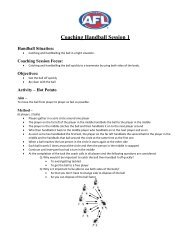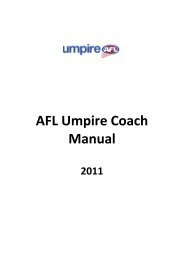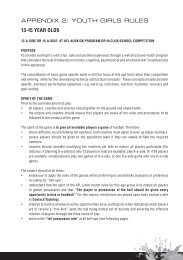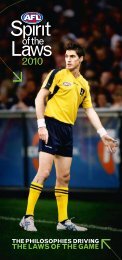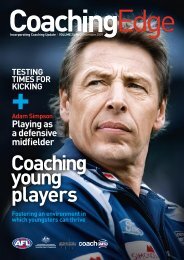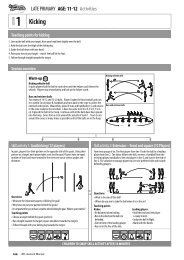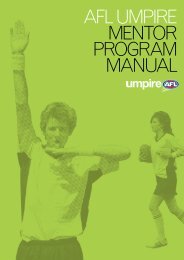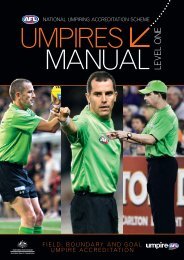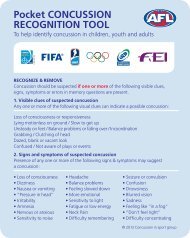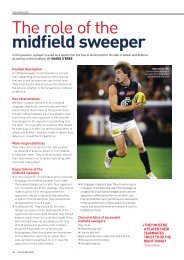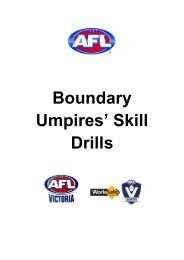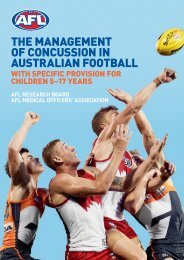2012 Youth Coaching Manual - AFL Community
2012 Youth Coaching Manual - AFL Community
2012 Youth Coaching Manual - AFL Community
Create successful ePaper yourself
Turn your PDF publications into a flip-book with our unique Google optimized e-Paper software.
Because adolescent sport does not have a specific set of guidelines, it relies on adopting either the children’s sport or adult<br />
sport approach. In most situations, coaches seem to adopt the adult model rather than the children’s model when coaching<br />
adolescents. Some of the problems created by this unique situation include the following issues:<br />
• Adult training regimes can negatively affect immature bodies and attitudes.<br />
• Previous freedoms are challenged by the demands for conformity.<br />
• Coaches verbalise their frustrations and opinions in an often demeaning and negative way.<br />
• Player skill levels may not be able to match the demands of an adult game.<br />
• Cognitive expectations may exceed the ability of the player to link the coach’s instructions with game situations.<br />
• Coaches may question the discipline of their players because they appear to be ignoring the coach’s requests.<br />
• Players may question their coach’s methods because the coach is often more dictatorial and demanding than their previous<br />
coach.<br />
Coaches who do not give enough attention to the above situations may find that a mutual lack of trust develops between<br />
them and their players. The coach observes players who seemingly continue to ignore their instructions, and players become<br />
disillusioned when they are criticised for a lack of effort when in fact lack of skills and understanding is the problem.<br />
There are many strategies that coaches can use to prevent unwanted tension developing between them and their players.<br />
However, before and during the use of these strategies it is essential for the coach to trust the player. Unconditional positive<br />
regard for the player is every coach’s responsibility. Players also have a responsibility to trust their coach but, for many<br />
adolescents, it is too much to expect them to have the emotional and/or psychological maturity to manage the dynamics of<br />
complex human relations effectively.<br />
Implications for coaches<br />
It is often difficult to know how sensitive players are to pubescent changes. Only when a coach asks the young male player to remove<br />
his top when training does the coach discover that the player is sensitive to his newly acquired rolls of fat around the abdomen. Allow<br />
variations in training attire when players are noticeably embarrassed about some of their physical developments. Next time there is a<br />
team function involving food, use the opportunity to serve a balanced meal, invite the parents, enlist the services of a nutritionist and<br />
provide the players with some understanding of the importance of each food type.<br />
Be prepared to modify performance expectations in response to accelerated weight and height gain, eyesight adjustments,<br />
primary sex characteristic changes and muscle and organ growth. During this time there may appear to be delays in response to<br />
training efforts. In most settings, the adolescent can mask the bodily changes caused by the onset of puberty. However, in the<br />
sport setting, everyone is focused on physical matters. Even before and after activity, there is usually a need to change in public.<br />
A coach can help to redirect a player’s attention away from their own anxieties about their bodies by focusing on the task of<br />
becoming a better player and team. Coaches should avoid making comments about physical changes unless they specifically<br />
relate to performance. In these cases, the matter should be discussed in private.<br />
Coaches who choose to coach adolescents will have the pleasure of witnessing dramatic changes in their players. These<br />
changes bring with them inherent difficulties as well as times for exploration and exhilaration.<br />
Coaches are not required to become obsessed about knowing how to cater for every individual’s response to<br />
change. It is, however, important to demonstrate understanding and support while focusing on providing an<br />
enjoyable and challenging sport experience.<br />
18 <strong>AFL</strong> <strong>Youth</strong> <strong>Coaching</strong> <strong>Manual</strong>



